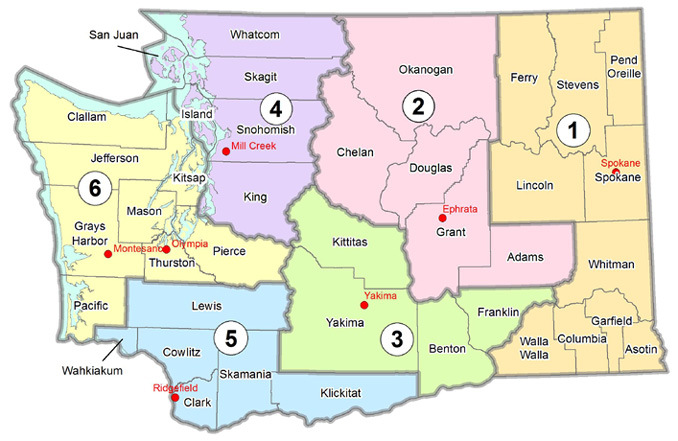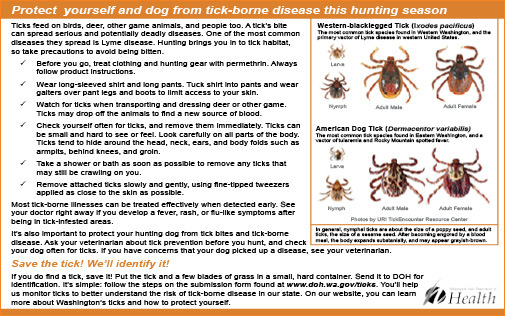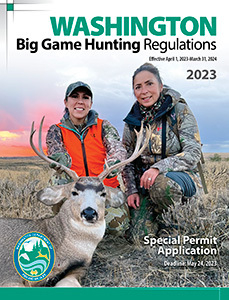Washington Department of Fish & Wildlife

Olympia Headquarters Office
Natural Resources Building
1111 Washington Street SE
Olympia, WA 98501
Dept. of Fish and Wildlife
PO Box 43200
Olympia, WA 98504-3200
Agency Receptionist: - (360) 902-2200
TDD: - (800) 833-6388
Wildlife Program: - (360) 902-2515
Report Wolf Incident (24 hrs) - (877) 933-9847
Enforcement Program: - (360) 902-2936
Poaching in Progress: - Dial: 911
To report a violation: (24 hrs) - (877) 933-9847
Fish Program: - (360) 902-2700
Hunter Education: - (360) 902-8111
Licensing Division: - (360) 902-2464
ADA Program - (360) 902-2349
Regional Offices
Region 1 - Spokane: - (509) 892-1001
2315 N. Discovery Place, Spokane Valley, WA 99216-1566
Region 2 - Ephrata: - (509) 754-4624
1550 Alder St. NW, Ephrata, WA 98823-9699
District Office - Wenatchee: - (509) 662-0452
3860 Highway 97A., Wenatchee, WA 98801-9607
Region 3 - Yakima: - (509) 575-2740
1701 S 24th Ave., Yakima, WA 98902-5720
Region 4 - Mill Creek: - (425) 775-1311
16018 Mill Creek Blvd., Mill Creek, WA 98012-1541
Region 5 - Ridgefield: - (360) 696-6211
5525 S 11th Street, Ridgefield, WA 98642
Region 6 - Montesano: - (360) 249-4628
48 Devonshire Road, Montesano, WA 98563-9618
WASHINGTON FISH AND WILDLIFE COMMISSION:
Barbara Baker, Commission Chair (Western Washington position, Thurston County)
Molly Linville, Vice Chair (Eastern Washington position, Douglas County)
James “Jim” R. Anderson (At-large position, Pierce County)
John Lehmkuhl, Ph.D. (Eastern Washington position, Chelan County)
Woodrow "Woody" Myers, Jr (At-large position, Spokane County)
Steve Parker (Eastern Washington position, Yakima County)
Tim Ragen, Ph.D. (Western Washington position, Skagit County)
Melanie Rowland, J.D. (At-large position, Okanogan County)
Lorna Smith (Western Washington position, Jefferson County)
WASHINGTON FISH AND WILDLIFE DEPARTMENT DIRECTOR:
Kelly Susewind
Buy Your Hunting License Online:
For License Information & Vendor Locations:
(360) 902-2464
Website:
Hunting Prospects:
Hunter Orange and/or Fluorescent Hunter Pink
Under the following conditions a minimum of 400 square inches of fluorescent hunter orange and/or fluorescent hunter pink exterior clothing is required. It must be worn above the waist and be visible from all sides. A hat, by itself, does not meet this requirement.
- It is unlawful to hunt upland birds or rabbits with a firearm, other than a muzzleloading firearm, during any upland game bird season unless the hunter is wearing fluorescent hunter orange and/or fluorescent hunter pink clothing.
- It is unlawful to hunt big game, except bear and cougar, with modern firearm equipment at any time in any manner unless the hunter is wearing fluorescent hunter orange and/or fluorescent hunter pink clothing.
- It is unlawful to hunt wildlife, except migratory birds, during those times and in those places open to taking of deer or elk during nonmaster hunter, modern firearm general seasons, unless the hunter is wearing fluorescent hunter orange and/or fluorescent hunter pink clothing.
Hunter Orange and/or Fluorescent Hunter Pink Clothing is NOT Required:
- During an upland game bird season for anyone hunting upland game birds with a muzzleloading firearm, bow and arrow, or falconry.
- While hunting in a muzzleloading or archery only season and possessing a valid muzzleloading or archery deer or elk tag.
- See WAC 220-414-080.
Help WDFW Manage Your Wildlife Resources
Radio-Collars and Chemical Immobilizing Drugs
Attention hunters: When drugs are used to capture an animal, it is marked with an ear tag printed with directions to call the Department before consuming the meat. This is so that WDFW staff can look up information associated with that animal to determine whether sufficient time has passed for drug residues to be depleted from the animal’s system per federal Food and Drug Administration guidelines. In most cases this time period is 30 days or less from the time the animal received the drugs, although there are exceptions depending on the drug that was used. If you harvest an animal that cannot be consumed due to potential drug residues remaining in the meat, the Department will re-issue your original transport tag, special permit, or special permit points as appropriate. It is legal to harvest wildlife with radio-collars and/or ear tags. Please notify WDFW if a collared animal is harvested using the contact information on the collar or by contacting your local WDFW office. Please be aware that several Tribes also capture animals and you may have to contact their biologists before contacting WDFW.
Review Hunts in the Upgraded
Hunt Planner!
Go to
“Hunt Planner Webmap”
- New features, improved functionality, and more intuitive design
- Browser-based, mobile-friendly web map*
- Review harvest statistics and trends alongside hunting opportunities**
* No additional Mobile App download required. Accessible in all modern web browsers
** Not available for all hunting opportunities


No Hunting of Pronghorn Antelope
Pronghorn antelope disappeared from Washington decades ago, but have recently been reintroduced to both the Yakama and Colville Reservations (where tribal governments have authority over resident wildlife). You may encounter small groups, both within, and well beyond the borders of these reservations. Although classified as a game species in Washington, there is currently NO harvest of pronghorns authorized by the Washington Fish and Wildlife Commission. The distribution of pronghorns in Washington overlaps that of mule deer. Hunters: Please be aware of the difference.
For more information on Pronghorn Antelope, see

